英语八年级下册 Unit 4 Why don‘t you talk to your parents ? Section A(3a-3c)课件(共有PPT25张)
文档属性
| 名称 | 英语八年级下册 Unit 4 Why don‘t you talk to your parents ? Section A(3a-3c)课件(共有PPT25张) | 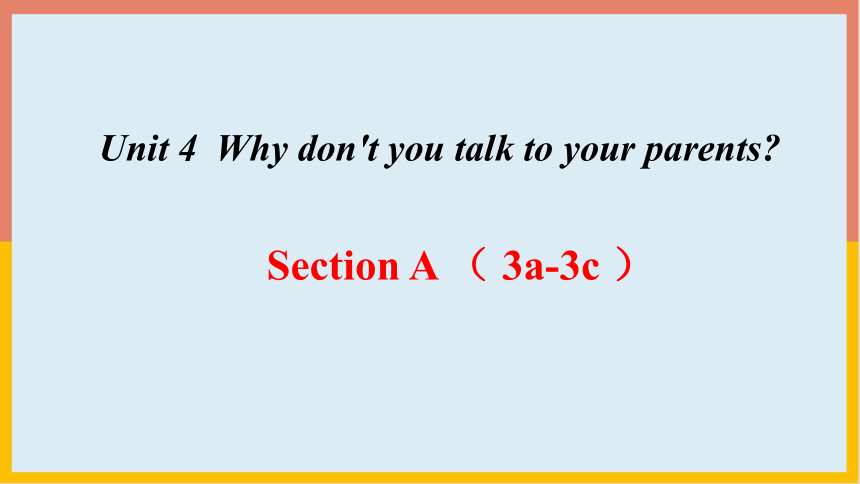 | |
| 格式 | pptx | ||
| 文件大小 | 1.1MB | ||
| 资源类型 | 教案 | ||
| 版本资源 | 人教新目标(Go for it)版 | ||
| 科目 | 英语 | ||
| 更新时间 | 2022-01-03 16:13:22 | ||
图片预览

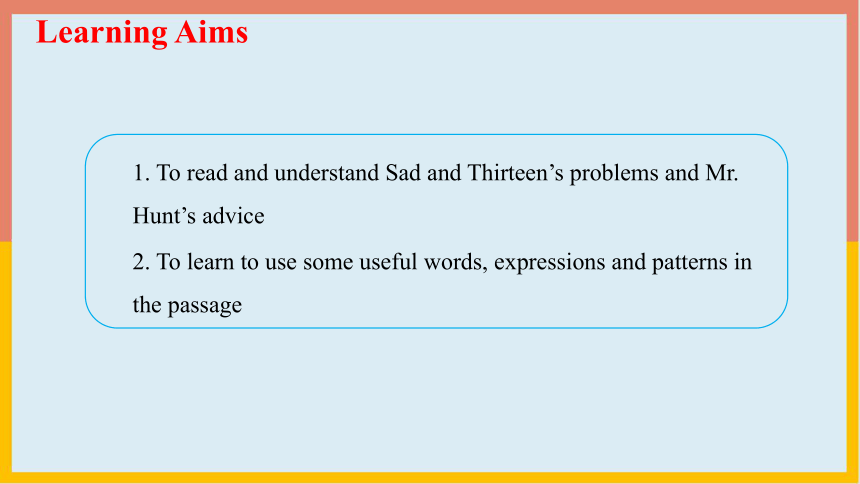
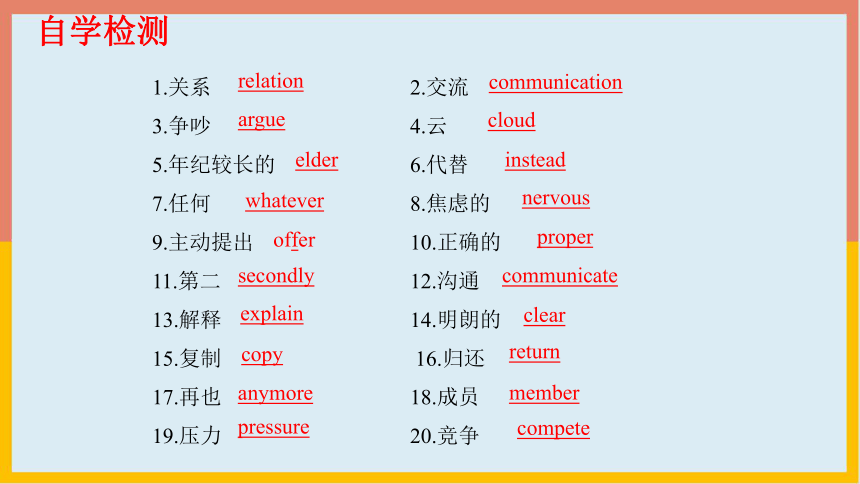
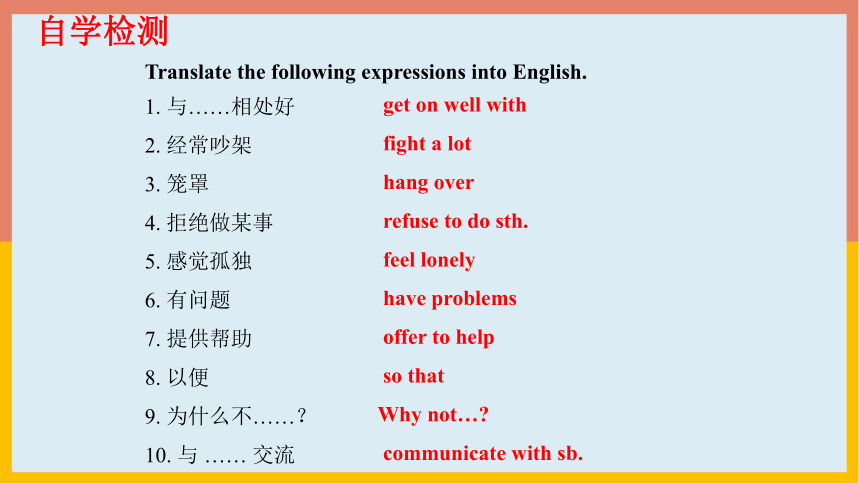
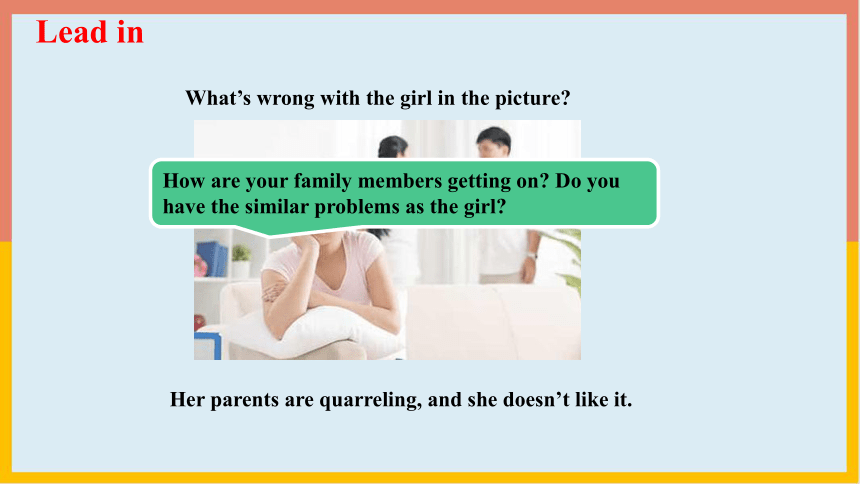
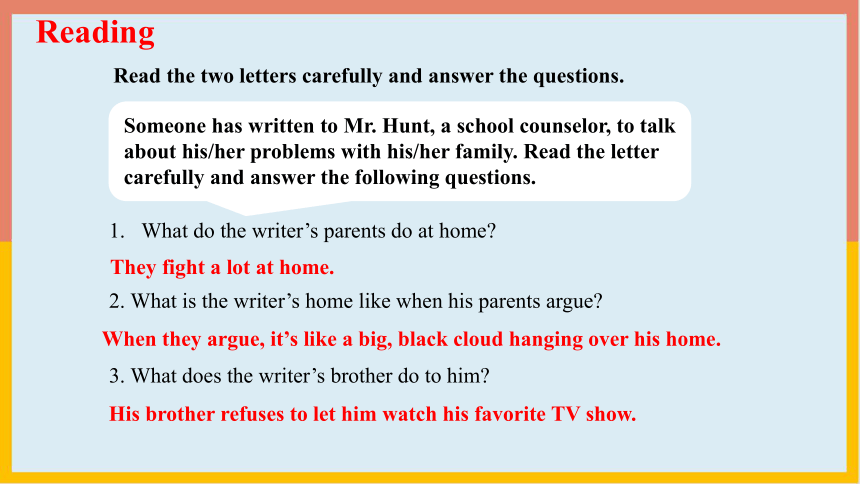
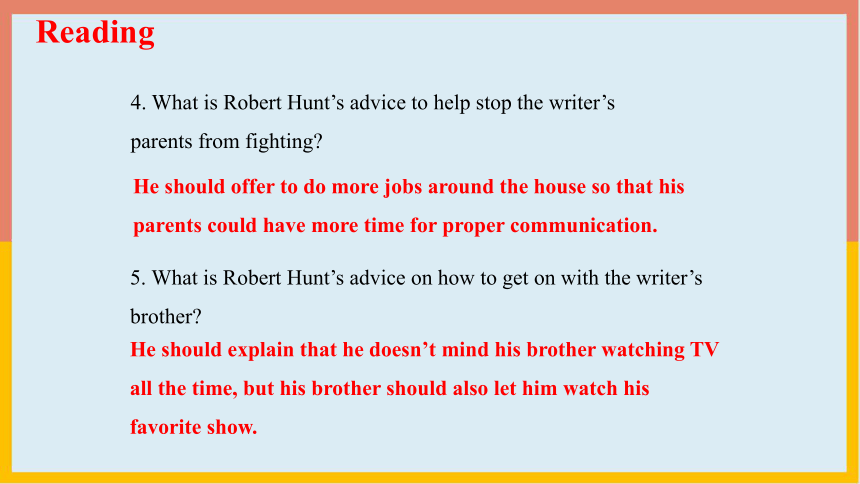
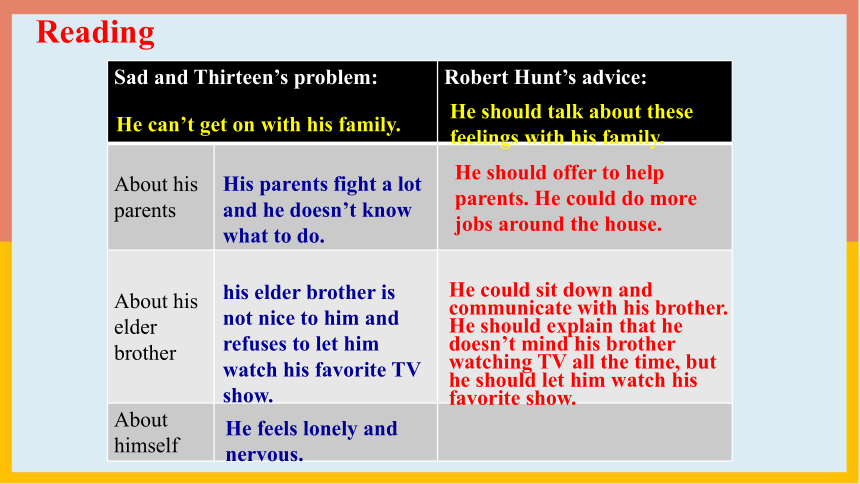

文档简介
(共25张PPT)
Unit 4 Why don't you talk to your parents
Section A ( 3a-3c )
1. To read and understand Sad and Thirteen’s problems and Mr. Hunt’s advice
2. To learn to use some useful words, expressions and patterns in the passage
Learning Aims
自学检测
1.关系 2.交流
3.争吵 4.云
5.年纪较长的 6.代替
7.任何 8.焦虑的
9.主动提出 10.正确的
11.第二 12.沟通
13.解释 14.明朗的
15.复制 16.归还
17.再也 18.成员
19.压力 20.竞争
relation
communication
argue
cloud
elder
instead
whatever
nervous
offer
proper
secondly
communicate
explain
clear
copy
return
anymore
member
pressure
compete
Translate the following expressions into English.
1. 与……相处好
2. 经常吵架
3. 笼罩
4. 拒绝做某事
5. 感觉孤独
6. 有问题
7. 提供帮助
8. 以便
9. 为什么不……?
10. 与 …… 交流
get on well with
fight a lot
hang over
refuse to do sth.
feel lonely
have problems
offer to help
so that
Why not…
communicate with sb.
自学检测
What’s wrong with the girl in the picture
Her parents are quarreling, and she doesn’t like it.
How are your family members getting on Do you have the similar problems as the girl
Lead in
What do the writer’s parents do at home
They fight a lot at home.
When they argue, it’s like a big, black cloud hanging over his home.
2. What is the writer’s home like when his parents argue
3. What does the writer’s brother do to him
His brother refuses to let him watch his favorite TV show.
Read the two letters carefully and answer the questions.
Someone has written to Mr. Hunt, a school counselor, to talk about his/her problems with his/her family. Read the letter carefully and answer the following questions.
Reading
5. What is Robert Hunt’s advice on how to get on with the writer’s brother
4. What is Robert Hunt’s advice to help stop the writer’s parents from fighting
He should offer to do more jobs around the house so that his parents could have more time for proper communication.
He should explain that he doesn’t mind his brother watching TV all the time, but his brother should also let him watch his favorite show.
Reading
complete the chart.
Sad and Thirteen’s problem: Robert Hunt’s advice:
About his parents
About his elder brother
About himself
He can’t get on with his family.
He should talk about these feelings with his family.
His parents fight a lot and he doesn’t know what to do.
his elder brother is not nice to him and refuses to let him watch his favorite TV show.
He feels lonely and nervous.
He should offer to help parents. He could do more jobs around the house.
He could sit down and communicate with his brother.
He should explain that he doesn’t mind his brother watching TV all the time, but he should let him watch his favorite show.
Reading
Discussion
3b
Do you agree or disagree with Mr. Hunt’s advice Why
I agree/disagree with his advice because…
Work in group
3c
Which words or phrases in the letters have the same or similar meanings as the following Write a sentence using each word or phrase.
1) make sth. clear — ______
2) talk — ___________
explain
Can you explain to me how to do this math problem
communicate
You should communicate with your teacher about your problem. I think she can help you.
3) not allow — ______
4) worried — ________
5) get along with — ______
refuse
Sam refused to come to my party.
nervous
I’m so nervous about the final examination. I didn’t get well prepared.
get on with
Daisy gets on well with our classmates. She is so popular.
1. What are your problems Which do you think is the most serious Why
2. How do you ask someone for advice
3. What’s the advice
4. What do you think of the advice
5. Are there any ways to solve your problems
Work in pairs
称呼
正文
署名
Read the letter again and please pay attention to its form.
1. My problem is that I can’t get on with my family.
*get on with/ get on (together)
和睦相处;关系良好
*= get along with/ get along (together)
She’s never really got on with her sister.
她和妹妹一向合不来。
We’re getting on much better now that we don't live together.
我们不住在一起了,关系处得好多了。
Language points
2. Instead he watches whatever he wants until late at night.
*until
( conj. / prep.) 直到
*not … until 直到……才
I waited until three o’clock.
我一直等到三点。
The little girl did not stop crying until she found her parents.
这个小女孩直到找到父母才停止哭泣。
Language points
*instead
*instead of:
短语介词,意思是“代替”、“而不是”
Lee was ill so I went instead.
李病了,所以我去了。
He didn’t reply. Instead, he turned on his heel and left the room.
他没有回答, 反 而转身离开了房间。
Instead of complaining, why don't we try to change things
我们为什么不试着改变这一切,而不是 抱怨呢?
adv. 代替;反而;却
Language points
3. I always feel lonely and nervous.
*lonely adj. 可做定语和表语. 孤独的,孤寂的(情感)
*alone (adj./ adv.) 一个人(客观)
一个孤独的老人
a lonely old man
他一个人。
He is alone.
我一个人住,但我并不感到孤独。
I live alone, but I don’t feel lonely.
Language points
4. … so that they have more time for proper communication.
Leave the keys out so that I remember to take them with me.
把钥匙放在外面,好让我记得带。
She worked hard so that everything would be ready in time.
她努力工作,为的是及时做好各项准备工作。
*so that
“以便,为了”, 引导目的状语从句
Language points
5. You should explain that you don’t mind him watching TV all the time.
I hope you don’t mind the noise.
希望你不要介意这声音。
Would you mind explaining it again
请你再解释一遍好吗?
You can’t change my mind.
你不能改变我的主意。
*mind
v. 介意 mind + doing / n.
*Would you mind… 表示请求和允许
*mind (n.) 思想,主意
Language points
Summary
What have you learnt
Exercise
Do the exercises online!
Unit 4-Section A-2随堂检测
课外趣读
Once a man went to India. In those times, we didn’t have planes or many other kinds of modern transportation as now. So the man went to India on foot. And when he got there, he saw a lot of fruit. In India they have plenty of fruit to sell, but much of it is expensive. He saw a big basket of very red,long fruit. And it was the cheapest in the shop.
So he went up and asked, “How much is it a kilo ” And the shopkeeper said, “Two rupees(卢比).” So he bought a whole kilo of the fruit and started eating it.
He ate some of it. Oh, my God! His eyes watered,his mouth watered; his eyes were burning(燃 烧),his head was burning; and his face became red. As he coughed, he jumped up and down, saying, “Ah! Ah! Ah!”
But he still kept eating the fruit! Some people looking at him and said, “You’re crazy, man. Those are chilies! People use them only a little bit to put into food for taste. You can’t just eat them by the handful like that, they’re not fruit!”
But the foolish man said, “No,I can’t stop! I paid money for them, and now I’ll eat them. It’s my money!”
What do you think of him We sometimes do a lot of things like that. We still continue just because we’ve put money, time and love into it. Just like the man, he ate the chilies and felt so bad but couldn’t stop because he didn’t want to waste the money he had paid.
So even if you’ve lost something, let it go and move on. That’s better than continuing to lose.
课外趣读
( )1. How did the man feel after he ate the “fruit” he bought
A. Bored. B. Upset. C. Terrible. D. Excited.
( )2. Why did the man keep eating the fruit
A. Because he was crazy. B. Because he paid for them.
C. Because they were delicious. D. Because they cost nothing.
( )3. Which is NOT mentioned in the passage
A. The color of chilies. B. The shape of chilies. C. The price of chilies. D. The danger of chilies.
( )4. Which of the following is TRUE according to the passage
A.The man bought two kilos of chilies. B.Most of the fruit is not expensive in India.
C.People in India usually put chilies into food for taste. D.People look at the man and said nothing.
( )5. What does the passage tell us
A.We’ll lose everything if we buy the cheapest. B.We can buy the wrong thing if we are careful enough.
C.We should let it go if we’ve lost something. D.We shouldn’t stop if we spend much money and time on it.
C
B
D
C
C
1. Write a short passage about a problem between you and your family or friends, and how it be solved.
2. Learn the important words and expressions by heart.
3.Preview the new words and expressions.
4.Preview Unit 4 Why don’t you talk to your parents -Section A-3课件
Homework
再见
Unit 4 Why don't you talk to your parents
Section A ( 3a-3c )
1. To read and understand Sad and Thirteen’s problems and Mr. Hunt’s advice
2. To learn to use some useful words, expressions and patterns in the passage
Learning Aims
自学检测
1.关系 2.交流
3.争吵 4.云
5.年纪较长的 6.代替
7.任何 8.焦虑的
9.主动提出 10.正确的
11.第二 12.沟通
13.解释 14.明朗的
15.复制 16.归还
17.再也 18.成员
19.压力 20.竞争
relation
communication
argue
cloud
elder
instead
whatever
nervous
offer
proper
secondly
communicate
explain
clear
copy
return
anymore
member
pressure
compete
Translate the following expressions into English.
1. 与……相处好
2. 经常吵架
3. 笼罩
4. 拒绝做某事
5. 感觉孤独
6. 有问题
7. 提供帮助
8. 以便
9. 为什么不……?
10. 与 …… 交流
get on well with
fight a lot
hang over
refuse to do sth.
feel lonely
have problems
offer to help
so that
Why not…
communicate with sb.
自学检测
What’s wrong with the girl in the picture
Her parents are quarreling, and she doesn’t like it.
How are your family members getting on Do you have the similar problems as the girl
Lead in
What do the writer’s parents do at home
They fight a lot at home.
When they argue, it’s like a big, black cloud hanging over his home.
2. What is the writer’s home like when his parents argue
3. What does the writer’s brother do to him
His brother refuses to let him watch his favorite TV show.
Read the two letters carefully and answer the questions.
Someone has written to Mr. Hunt, a school counselor, to talk about his/her problems with his/her family. Read the letter carefully and answer the following questions.
Reading
5. What is Robert Hunt’s advice on how to get on with the writer’s brother
4. What is Robert Hunt’s advice to help stop the writer’s parents from fighting
He should offer to do more jobs around the house so that his parents could have more time for proper communication.
He should explain that he doesn’t mind his brother watching TV all the time, but his brother should also let him watch his favorite show.
Reading
complete the chart.
Sad and Thirteen’s problem: Robert Hunt’s advice:
About his parents
About his elder brother
About himself
He can’t get on with his family.
He should talk about these feelings with his family.
His parents fight a lot and he doesn’t know what to do.
his elder brother is not nice to him and refuses to let him watch his favorite TV show.
He feels lonely and nervous.
He should offer to help parents. He could do more jobs around the house.
He could sit down and communicate with his brother.
He should explain that he doesn’t mind his brother watching TV all the time, but he should let him watch his favorite show.
Reading
Discussion
3b
Do you agree or disagree with Mr. Hunt’s advice Why
I agree/disagree with his advice because…
Work in group
3c
Which words or phrases in the letters have the same or similar meanings as the following Write a sentence using each word or phrase.
1) make sth. clear — ______
2) talk — ___________
explain
Can you explain to me how to do this math problem
communicate
You should communicate with your teacher about your problem. I think she can help you.
3) not allow — ______
4) worried — ________
5) get along with — ______
refuse
Sam refused to come to my party.
nervous
I’m so nervous about the final examination. I didn’t get well prepared.
get on with
Daisy gets on well with our classmates. She is so popular.
1. What are your problems Which do you think is the most serious Why
2. How do you ask someone for advice
3. What’s the advice
4. What do you think of the advice
5. Are there any ways to solve your problems
Work in pairs
称呼
正文
署名
Read the letter again and please pay attention to its form.
1. My problem is that I can’t get on with my family.
*get on with/ get on (together)
和睦相处;关系良好
*= get along with/ get along (together)
She’s never really got on with her sister.
她和妹妹一向合不来。
We’re getting on much better now that we don't live together.
我们不住在一起了,关系处得好多了。
Language points
2. Instead he watches whatever he wants until late at night.
*until
( conj. / prep.) 直到
*not … until 直到……才
I waited until three o’clock.
我一直等到三点。
The little girl did not stop crying until she found her parents.
这个小女孩直到找到父母才停止哭泣。
Language points
*instead
*instead of:
短语介词,意思是“代替”、“而不是”
Lee was ill so I went instead.
李病了,所以我去了。
He didn’t reply. Instead, he turned on his heel and left the room.
他没有回答, 反 而转身离开了房间。
Instead of complaining, why don't we try to change things
我们为什么不试着改变这一切,而不是 抱怨呢?
adv. 代替;反而;却
Language points
3. I always feel lonely and nervous.
*lonely adj. 可做定语和表语. 孤独的,孤寂的(情感)
*alone (adj./ adv.) 一个人(客观)
一个孤独的老人
a lonely old man
他一个人。
He is alone.
我一个人住,但我并不感到孤独。
I live alone, but I don’t feel lonely.
Language points
4. … so that they have more time for proper communication.
Leave the keys out so that I remember to take them with me.
把钥匙放在外面,好让我记得带。
She worked hard so that everything would be ready in time.
她努力工作,为的是及时做好各项准备工作。
*so that
“以便,为了”, 引导目的状语从句
Language points
5. You should explain that you don’t mind him watching TV all the time.
I hope you don’t mind the noise.
希望你不要介意这声音。
Would you mind explaining it again
请你再解释一遍好吗?
You can’t change my mind.
你不能改变我的主意。
*mind
v. 介意 mind + doing / n.
*Would you mind… 表示请求和允许
*mind (n.) 思想,主意
Language points
Summary
What have you learnt
Exercise
Do the exercises online!
Unit 4-Section A-2随堂检测
课外趣读
Once a man went to India. In those times, we didn’t have planes or many other kinds of modern transportation as now. So the man went to India on foot. And when he got there, he saw a lot of fruit. In India they have plenty of fruit to sell, but much of it is expensive. He saw a big basket of very red,long fruit. And it was the cheapest in the shop.
So he went up and asked, “How much is it a kilo ” And the shopkeeper said, “Two rupees(卢比).” So he bought a whole kilo of the fruit and started eating it.
He ate some of it. Oh, my God! His eyes watered,his mouth watered; his eyes were burning(燃 烧),his head was burning; and his face became red. As he coughed, he jumped up and down, saying, “Ah! Ah! Ah!”
But he still kept eating the fruit! Some people looking at him and said, “You’re crazy, man. Those are chilies! People use them only a little bit to put into food for taste. You can’t just eat them by the handful like that, they’re not fruit!”
But the foolish man said, “No,I can’t stop! I paid money for them, and now I’ll eat them. It’s my money!”
What do you think of him We sometimes do a lot of things like that. We still continue just because we’ve put money, time and love into it. Just like the man, he ate the chilies and felt so bad but couldn’t stop because he didn’t want to waste the money he had paid.
So even if you’ve lost something, let it go and move on. That’s better than continuing to lose.
课外趣读
( )1. How did the man feel after he ate the “fruit” he bought
A. Bored. B. Upset. C. Terrible. D. Excited.
( )2. Why did the man keep eating the fruit
A. Because he was crazy. B. Because he paid for them.
C. Because they were delicious. D. Because they cost nothing.
( )3. Which is NOT mentioned in the passage
A. The color of chilies. B. The shape of chilies. C. The price of chilies. D. The danger of chilies.
( )4. Which of the following is TRUE according to the passage
A.The man bought two kilos of chilies. B.Most of the fruit is not expensive in India.
C.People in India usually put chilies into food for taste. D.People look at the man and said nothing.
( )5. What does the passage tell us
A.We’ll lose everything if we buy the cheapest. B.We can buy the wrong thing if we are careful enough.
C.We should let it go if we’ve lost something. D.We shouldn’t stop if we spend much money and time on it.
C
B
D
C
C
1. Write a short passage about a problem between you and your family or friends, and how it be solved.
2. Learn the important words and expressions by heart.
3.Preview the new words and expressions.
4.Preview Unit 4 Why don’t you talk to your parents -Section A-3课件
Homework
再见
同课章节目录
- Unit 1 What's the matter?
- Section A
- Section B
- Unit 2 I'll help to clean up the city parks.
- Section A
- Section B
- Unit 3 Could you please clean your room?
- Section A
- Section B
- Unit 4 Why don't you talk to your parents?
- Section A
- Section B
- Unit 5 What were you doing when the rainstorm came
- Section A
- Section B
- Review of Units 1-5
- Unit 6 An old man tried to move the mountains.
- Section A
- Section B
- Unit 7 What's the highest mountain in the world?
- Section A
- Section B
- Unit 8 Have you read Treasure Island yet?
- Section A
- Section B
- Unit 9 Have you ever been to a museum?
- Section A
- Section B
- Unit 10 I've had this bike for three years.
- Section A
- Section B
